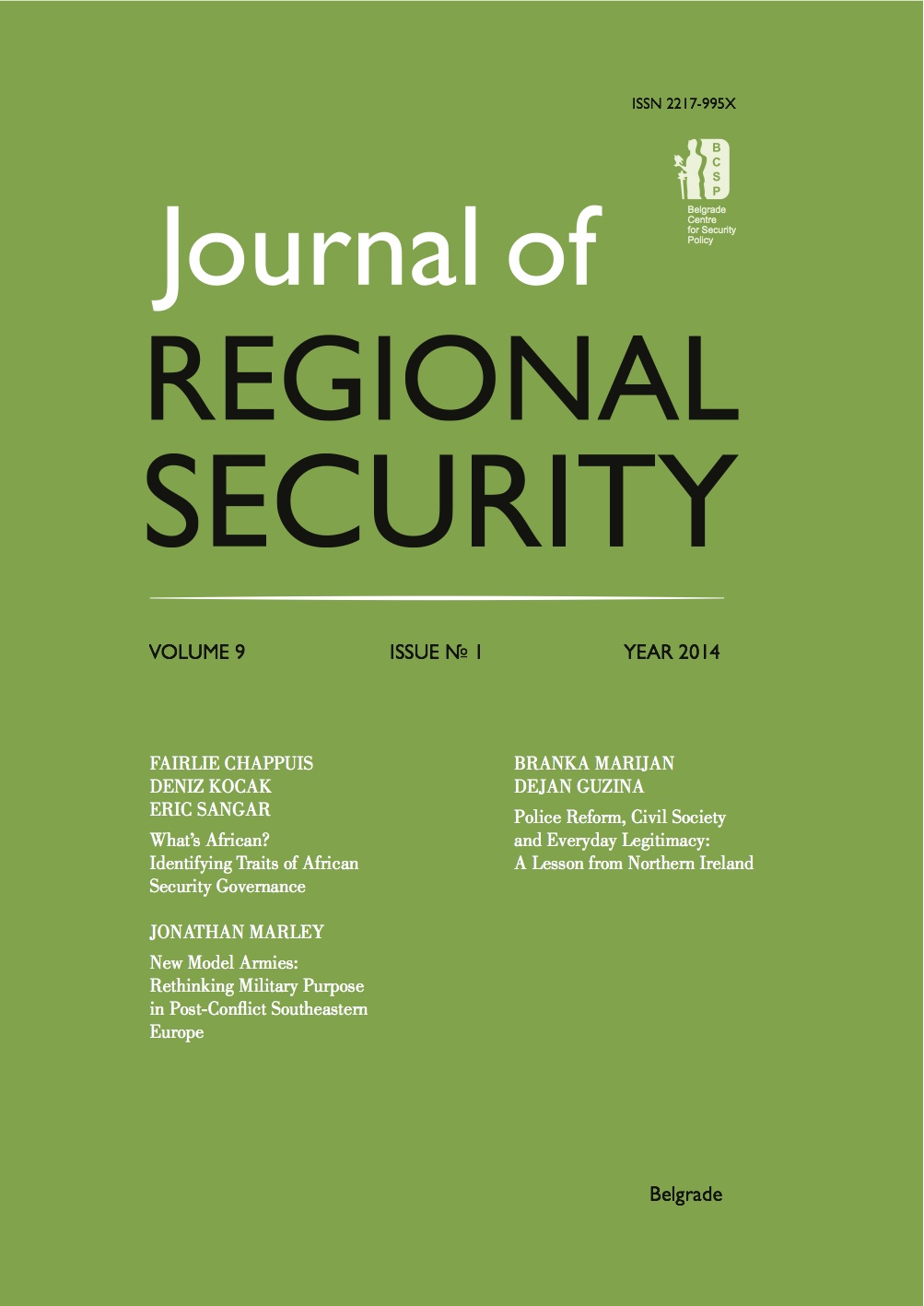Police Reform, Civil Society and Everyday Legitimacy: A Lesson From Northern Ireland
Abstract
In post-conflict zones, there is a need to better understand the role of civil society in building the legitimacy of reformed police institutions. Northern Ireland provides an instructive case in this regard, as community involvement and civilian oversight of policing structures were prominent in the reform process. While much has been achieved since the 1999 Independent Commission on Policing, the question of police legitimation is still largely unresolved. In order for police reform to be fully realized, and to ensure that everyday legitimacy is established, more attention must be paid to building relationships between the police and local communities.
References
Brogden, Mike. 2005. “Horses for Courses” and “Thin Blue Lines”: Community Policing in Transitional Society.” Police Quarterly 8(1): 65−98.
Byrne, Jonny and John Topping. 2012. “Community Safety: A Decade of Development, Delivery, Challenge and Change in Northern Ireland.” Belfast Conflict Resolution Consortium. http://www.bcrc.eu/userfiles/Community%20Safety%20 -%20A%20Decade%20of%20Change%20in%20NI.pdf
Caparini, Marina and Otwin Marenin, eds. 2004. Transforming Police in Central and Eastern Europe: Process and Progress. Geneva: Centre for the Democratic Control of Armed Forces/LIT.
Caparini, Marina. 2005. “Enabling Civil Society in Security Sector Reconstruction.” In Security Governance in Post-Conflict Peacebuilding, edited by Alan Bryden and Heiner Hänggi, 69−91. Geneva: Centre for the Democratic Control of Armed Forces (DCAF).
Ellison, Graham and Conor O’Reilly. 2008. “‘Ulster’s policing goes global’: The police reform process in Northern Ireland and the creation of a global brand.” Crime Law and Social Change 50 (4−5): 331−351.
Ellison, Graham. 2007. “A Blueprint for Democratic Policing Anywhere in the World?: Police Reform, Political Transition, and Conflict Resolution in Northern Ireland.” Police Quarterly 10 (3): 243−269.
Gethins, M. 2011. Catholic Police Officers in Northern Ireland: Voices out of Silence. Manchester: Manchester University Press.
Goldsmith, Andrew. 2005. “Police Reform and the Problem of Trust.” Theoretical Criminology 9(4): 443−470.
Hays, R. Allen. 2013. “Policing in Northern Ireland: Community Control, Community Policing, and the Search for Legitimacy.” Urban Affairs Review 49(4): 557–592.
Mac Ginty, Roger. 2011. International Peacebuilding and Local Resistance: Hybrid Forms of Peace. Basingstoke, UK: Palgrave Macmillan.
McGarry, John and Brendan O’Leary. 2009. “Power shared after the deaths of thousands.” In Consociational Theory: McGarry & O’Leary and the Northern Ireland Conflict, edited by Rupert Taylor, 15-84. New York: Routledge.
McGarry, John. 2000. “Police Reform in Northern Ireland.” Irish Political Studies 15(1): 173−182.
Mulcahy, Aogan. 2006. Policing Northern Ireland: Conflict, legitimacy and reform. London: Willan Publishing.
NIDirect. 2013. “Policing and Community Safety Partnerships.” http://www.nidirect. gov.uk/policing-and-community-safety-partnerships (accessed February 27, 2014).
O’Rawe, Mary and Linda Moore. 2000. “Accountability and Police Complaints in Northern Ireland: Leaving the Past Behind?” In Civilian Oversight of Policing: Governance, Democracy, and Human Rights, edited by Andrew Goldsmith and Colleen Lewis, 259-94. Portland, Oregon: Hart Publishing.
Pierson, Claire. 2011. “The CitySide Initative-Community-based Peace-building in North Belfast.” Institute for Conflict Research, June.
PONI. 2014. “About the Office.” http://www.policeombudsman.org/modules/pages/ about.cfm (accessed February 27, 2014).
PSNI. 2011. “Policing with the Community 2020 Strategy.” http://www.psni.police. uk/pwc_-_2020_v2.pdf (accessed February 27, 2014).
Shearing, Clifford. 2001. “A Nodal Conception of Governance: Thoughts on a Policing Commission.” Policing and Society 11(3–4): 259–72.
Smyth, Jim. 2002. “Community policing and the reform of the Royal Ulster Constabulary.” Policing: An International Journal of Police Strategies & Management 25 (1): 110−124.
Starmer, Keir. 2007. “Monitoring the Performance of the Police Service in Northern Ireland in complying with the Human Rights Act 1998.” Policing 1(1): 94−101.
The Community Foundation for Northern Ireland. 2012. “Community Policing: the challenges from a community perspective.” Policy Briefing, January. http:// www.communityfoundationni.org/download/files/CFNIObs%20Briefing%20 CommunityPolicing%201-2012.pdf.
Van Craen, Maarten. 2013. “Explaining Majority and Minority Trust in the Police.” Justice Quarterly 30(6): 1042−1067.
Authors retain copyright of the published papers and grant to the publisher the non-exclusive right to publish the article, to be cited as its original publisher in case of reuse, and to distribute it in all forms and media.
The published articles will be distributed under the Creative Commons Attribution 4.0 International License (CC BY). It is allowed to copy and redistribute the material in any medium or format, and remix, transform, and build upon it for any purpose, even commercially, as long as appropriate credit is given to the original author(s), a link to the license is provided and it is indicated if changes were made. / The published articles will be distributed under the Creative Commons Attribution ShareAlike 4.0 International license (CC BY-SA). It is allowed to copy and redistribute the material in any medium or format, and remix, transform, and build upon it for any purpose, even commercially, as long as appropriate credit is given to the original author(s), a link to the license is provided, it is indicated if changes were made and the new work is distributed under the same license as the original.
Users are required to provide full bibliographic description of the original publication (authors, article title, journal title, volume, issue, pages), as well as its DOI code. In electronic publishing, users are also required to link the content with both the original article published in Journal of Regional Security and the licence used.
Authors are able to enter into separate, additional contractual arrangements for the non-exclusive distribution of the journal's published version of the work (e.g., post it to an institutional repository or publish it in a book), with an acknowledgement of its initial publication in this journal.
Authors are permitted to deposit author’s pre-print / author’s post-print (accepted version) / publisher's version (PDF) of their work in an institutional repository, subject-based repository, author's personal website (including social networking sites, such as ResearchGate, Academia.edu, etc.), and/or departmental website prior or during the submission process / at any time after the acceptance of the manuscript / at any time after publication.
Full bibliographic information (authors, article title, journal title, volume, issue, pages) about the original publication must be provided and links must be made to the article's DOI and the license.

